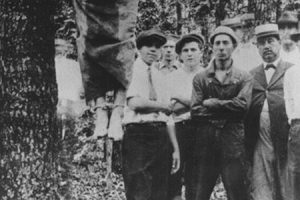Podcast: Play in new window | Download
Seeking Justice: The Leo Frank Case Revisited
In 1913, a 29 year old New York Jew who managed a pencil factory outside of Atlanta was hauled out of his jail cell in Marietta, Georgia by a group of prominent citizens including the judge who found him guilty. He was placed standing table. A rope was tied to a tall tree and put around his neck. The judge kicked the table out from under him. Leo Frank was lynched. The case had became a national scandal with Frank being accused and found guilty of raping and murdering a 13-year-old girl, Mary Phagan, who worked at the pencil factory. Frank was sentence to death, although he was innocent, but lost his appeals all the way up to the Supreme Court. The governor of Georgia, feeling uneasy about the impending execution, commuted his sentenced to life in prison. The commutation incited the local citizens to carry out the execution themselves by breaking into Frank’s cell and taking him out for the lynching. The Museum of Jewish Heritage in Battery Park City at the southern tip of Manhattan is featuring a show on the Frank case.
Guest – Steve Oney, was educated at the University of Georgia and at Harvard, where he was a Nieman Fellow. He worked for many years as a staff writer for the Atlanta Journal-Constitution Magazine. He has also contributed articles to many national publications, including Esquire, Playboy, Premiere, GQ and the New York Times Magazine. Oney lives in Los Angeles with his wife, Madeline Stuart. Steve is the author of The Dead Shall Rise : an acclaimed account that re-creates the entire story for the first time, from the police investigations to the gripping trial to the brutal lynching and its aftermath. Oney vividly renders Atlanta, a city enjoying newfound prosperity a half-century after the Civil War, but still rife with barely hidden prejudices and resentments. He introduces a Dickensian pageant of characters, including zealous policemen, intrepid reporters, Frank’s martyred wife, and a fiery populist who manipulated local anger at Northern newspapers that pushed for Frank’s exoneration. Combining investigative journalism and sweeping social history, this is the definitive account of one of American history’s most repellent and most fascinating moments.
—-
Dakota Access Pipeline: Dispatch #4
The Dakota Access Pipeline which is planned to bring dirty shale oil through North Dakota and underneath the Missouri River into the Midwest has been stalled by a powerful occupation of representatives of some 180 native American tribes and several thousand supporters who are camped out in North Dakota. The pipeline is being constructed by a Texas company. It is a $3.8 billion project financed by loans from Goldman Sachs, the Chase Manhattan Bank, UBS bank and other banks. The amount of air pollution emitted by not keeping this oil in the hole is substantial and will contribute substantially to global warming. Moreover, if the pipe breaks under the river, as these pipelines frequently do, such an incident could pollute the drinking water of up to 20 million people who depend on it.
Guest – National Lawyers Guild Attorney Jeff Haas, recently returned from living at the North Dakota encampment with thousands of Native Americans and climate change activists who gathered in solidarity with the Standing Rock Indian tribe in North Dakota to protest the pipeline construction. Jeff Haas was a founding partner of the Peoples Law Office in Chicago. He victoriously represented the family of Fred Hampton, the chairman of the Chicago Black Panther Party and proved that Hampton was assassinated by the FBI and Chicago Police Department. He’s also author of the book The Assassination of Fred Hampton.
Sacred Stone Camp Legal Defense – Lawyers wanting to support the Sacred Stone Camp, contact Attorney Robin Martinez – robin.martinez@martinezlaw.net



